Social Scientists out in the Field
1. A Visit to Volcanic Ground Zero - Level 1 Geography
One hundred and fifty-three people died. Visiting the site of the Tarawera eruption more than 100 years later, the experiential learners from three Geography classes visited the ruins of the Buried Village, near Rotorua.
Gathering case-study information for their Extreme Natural Events assessment, students learned that people at the time didn’t understand what was happening or how to respond. With the benefit of hindsight, a presentation at Rotorua museum - helped by a shaking movie theatre - explained what happened that night.
Following a luge-riding experience on Mt Ngongotaha, the group visited a dairy farm to learn about the environmental impacts of milk production,so equipping them for their Sustainability internal assessment.
 |
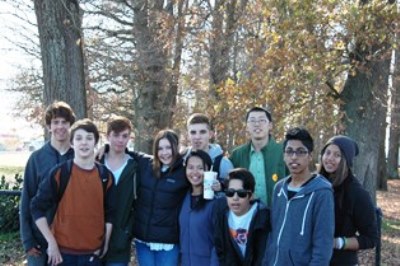 |
2. Adventure Jet Blast - Years 12 and 13 Tourism
Several students got soaked! Ripping across Waitemata Harbour in a jetboat was bound to splash a few people. However, it was the 360 degree spins that threw the Year 12 and 13 Tourism students together and left them screaming and dripping. This activity is typical of the adventure tourism that visitors to New Zealand expect and which helps provide around ten percent of the jobs in this country. Next stop was the observation deck of the Sky Tower, from where students watched Skyjumpers leaping off the platform. A Sky City staffer explained the jobs available within the tower and the career progression of several employees. Visiting the headquarters of our tourism course provider also gave students an insight into further training and careers that can follow school. |
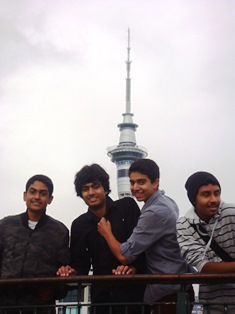 |
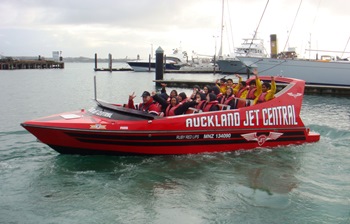 |
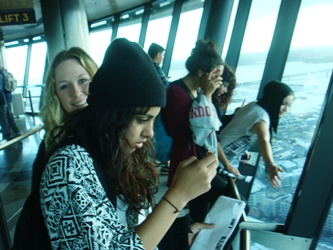 |
3 .12,000 jobs. Apply here. Years 12 and 13 Tourism
Auckland Airport provides more jobs than many whole towns do. From frontline aircrew through retail, accommodation, management, freight and security, more than 12,000 jobs exist at the airport.
It is here that the Year 12 and 13 Tourism students visited, to see first hand some of the workplaces and hear people in the industry describe their jobs.
At the Travel Careers and Training campus, students experienced the simulated cabin of a wide-body jet, where cabin-crew trainees were in class. They learned to assemble the canopy of a liferaft and visited the cockpit of a Boeing 737. Security is a huge issue in airports, and an aviation security consultant gave a talk on security careers and some anecdotes about strange items that people try to get through the border.
Hospitality careers were discussed at the Novotel Hotel, where students were given a tour of rooms and suites.
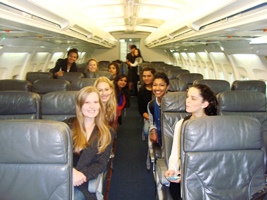 |
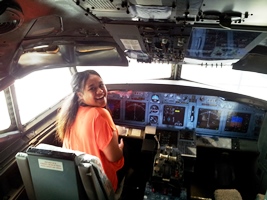 |
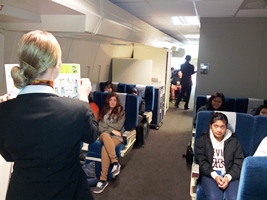 |
Senior Geographers the Best in Auckland!
| Competing against 21 schools from throughout the Auckland region, the Lynfield College team won the AGTA (Auckland Geography Teachers Association) Year 12 and 13 Geography quiz held recently at St Cuthbert’s College. Ryan Williams, Ricoh Kumar, Walid Bouladam and Edmund Hodges competed in 9 fun but exhausting rounds, including a final round beating other teams to the bell. Lynfield College has now won this competition four times since 2004. Congratulations on a wonderful win! |
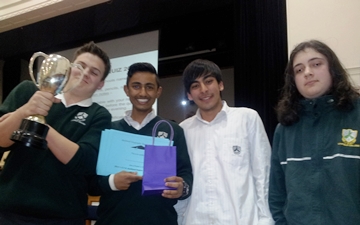 |
Kitty Sun, Year 10 - Award for her Geography Essay
Kitty Sun, Year 10, has achieved a Highly Commended award in the Schools’ Geography Research Competition run by the New Zealand Geographical Society.
The topic was Understanding Factors that Build Resilience, and the judge, Peter Holland from the University of Otago’s Geography Department, had this to say about Kitty’s essay..
"Your essay impressed me as an informative reflection on the migrant experience. In it you argued that while individual resilience is vitally important for survival in a challenging environment, so too is resilience at the levels of the family and communal institutions, notably churches, social organisations, and the like. You then presented these ideas in a very fine introduction before writing about metropolitan Auckland as the setting for your study. You have provided a very fine account of the city’s economic, environmental and social conditions, and discussed their involvement with resilience at the individual, family and community levels.
The probing account of your interview is a further strength of this essay. The interviewee had experienced episodes of earthquake and outbreaks of disease in her homeland before emigrating to New Zealand, and you argued that these events made her more resilient and better able to deal with the challenges of life in a new country; her experiences in China and Auckland “taught her more about herself ... [and] allowed her to discover and understand her own individual ways of being resilient.” This is an intriguing notion -- in an aware and sensitive person, resilience fosters further resilience. "
Congratulations, Kitty!
Year 12 Geography Ruapehu Ramblings
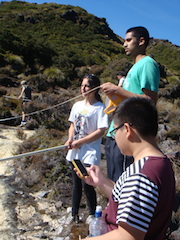 |
While some people might shy away from an active volcano, the Year 12 Geographers recently experienced a three day trip on the flanks of Mt Ruapehu, New Zealand’s largest stratovolcano. Students compared differences in stream velocity, vegetation and slope between two locations, including a walk to Silica Rapids.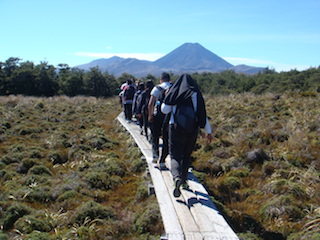 |
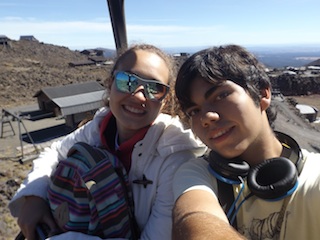 Working on two assessments, they also investigated the issue of ski field development on New Zealand’s first National Park (and a United Nations World Heritage Site). In stunning, sunny weather, a highlight was riding the chairlifts to New Zealand’s highest café at 2020 metres. |
Year 11 Economists Explore the Business of McDonalds
Model United Nations Assembly
| On the 16th and 17th of May approximately 300 students from around the Auckland region took part in the 2014 Model United Nations Assembly. Lynfield College's proud history of participation in this event was capably continued by our two teams of senior Social Science students. Gauri Prabhakar, Liam Bateman and Zachary Walker-Rendall represented Pakistan and Tian Cooke, Anton Stuart and Gavin Feng represented the nation of Libya. As always, the teams needed to prepare and deliver speeches to the Model United Nations Assembly and engage in some frenzied coalition-building to get amendments passed and deals brokered. There was even a crisis the United Nations needed to urgently resolve (in this case, a Russian invasion of the Ukraine). |
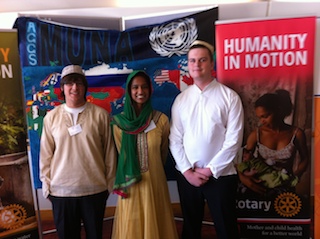 |
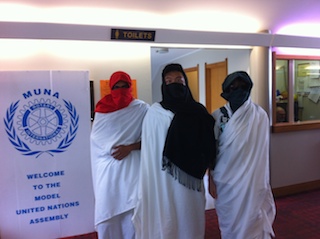 |
